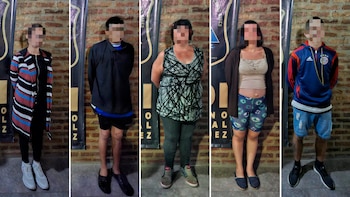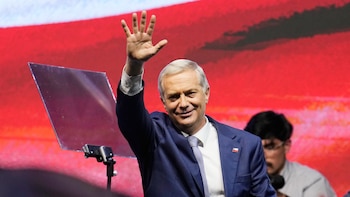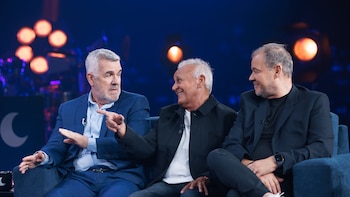
TOKYO - Étienne Thobois knows well what an Olympic Games is, having lived them from the inside, as a competitor, in Atlanta 96. But his badminton playing days are long gone, and the challenge for the Frenchman is for Paris 2024 to meet its goal of being an “open and urban” Games. On that path, he admits that the Buenos Aires 2018 Youth Games were an inspiration for what will be seen in three years’ time.
“Definitely Buenos Aires was an inspiration, and we are trying to take it to the next step”, said the CEO of Paris 2024 during an interview with Around the Rings in Tokyo in which he admitted that he is keeping his fingers crossed for any mishaps, but that he is confident of implementing “Plan A” and not being forced into a “Plan B” as happened to Tokyo 2020.
- The Paris Games are only three years ahead, instead of four, as usual at this stage. Is this an advantage or a disadvantage?
- It’s actually better for us, we kind of like the fact that we had more time to prepare strategically and to plan strategically ahead. And now we have three years to deliver, frankly we just adapted. Looking at our situation in Paris... Most of our infrastructure is there, we have not a lot to build. We can focus on the delivery and the operations, as well as the innovation program. We are where we need to be at this time of the project. This change of schedule has been positive for Paris.
- If you have to describe the Paris Games, how is it going to be different from Tokyo and to all other previous Games? What’s the distinctive aspect of Paris 2024?
- What I hope is going to be different is the fact that we have spectators. We want to have the most open Games, the most connected with the people, being able to take competitions out of the stadiums and taking competitions to the center of Paris. Our president Tony Estanguet has mentioned the opportunity of organizing an opening ceremony outside of the stadium, in the center of the city, to bring the excitement closer to the people, we’ll have fantastic temporary venues in the heart of the city, La Concorde, for instance. Versailles, all these landmarks. The marathon will allow you and me to run an Olympic marathon in the same conditions of the athletes. All these are new things. Or the Club Paris 2024, which is a form to challenge the population to do more sports.
- Buenos Aires held an opening ceremony in the heart of the city for their Youth Games. Did you talk to them to understand their experience?
- I was discussing it with Gerardo Werthein again this morning. It’s been an inspiration, they managed, with Buenos Aires 2018 to engage the population. They were in the middle of a financial crisis, with a lot of difficulties, but the population was behind those Games, because they were part of it. They were able to visit venues, open venues, they were part of the opening ceremony. And that urban park where you had all the new sports was also an inspiration for us, and we are going to do that in La Concorde. It was a great success. The Youth Olympic Games are a laboratory, and in that particular case they were inspiring. Definitely Buenos Aires was an inspiration, and we are trying to take it to the next step.
- Would you say that Paris’ ambition is to stage the most urban Games ever?
- We have a very good balance between a few infrastructures. We will have a swimming center with a capacity for 5.000 people in the north of Paris, in an area that needs urban development, and the Games are also for that.
- Like the East London experience?
- Probably smaller, but definitely will have an impact. We use the architecture, the culture and heritage of Paris to offer incredible images. We’ll use our landmarks to show that the Games are transforming Paris into an Olympic park. We have a fantastic city for that, also with the river in the middle, which is a symbol for us. You know, it’s been a hundred years and we are very ambitious about what France and the city has to offer.

- France, and specifically Paris, suffered terrorist attacks in recent years, How will you deal with security when you say, at the same time, that you want open games?
- Definitely it’s a key issue in the Games, and it’s not a new one. Take ‘72. We know that security is at heart of what we have to do. Sadly, as you said, we have experience in managing this kind of situation. We have to tackle that very proactively. If you look at the track record in terms of security, we have been able to deliver big events, like Euro 2016, the Tour de France every year, which covers a pretty big area. Definitely it brings new challenges to go into the city, but we feel comfortable, the city allows us to do that. If you look at the river, there are no big buildings surrounding that area. It is part of our study and concern.
- I assume you cross your fingers, but you must have a Plan B in case the epidemic continues in 2024 or a new one shows up.
- If you look at the past Games, they have always dealt with difficult situations: the global financial crisis, the local politics and Zika for Rio 2016... Here in Tokyo the covid-19, and every time the local organization has to adapt, the IOC, the IFs, the Olympic family. We want to be ready, we have the experience of Tokyo 2020, but, three years out, I want to concentrate on what makes the Paris Games special, it is not just wishful thinking, but I think we should have, first and foremost, have a great Plan A, because, fingers crossed, we want to deliver that one. Open Games, sustainable, responsible, a festival to put forward what France has best.
- Guy Drut, IOC member in France, said last year that, because of COVID-19, “the beautiful Paris project” is now “obsolete, outdated, out of touch with reality”. What’s the situation now?
- Well, I wouldn’t completely agree with that statement. We optimized the concept, we feel the plan is even stronger than it was during the bid.
- The surfing in Tahiti is a distinctive issue of Paris 2024, how do you work with it?
- Actually Tahiti is something we are really keen on. We believe in athletes first, the conditions there are fantastic, a fantastic, mythic wave. Surfing is part of the culture there. It will be in prime time in Paris, and fits very well with the schedule. It’s a symbol also that France is a diverse country, it’s very well welcomed by the local population. Tahiti will add to the Paris experience, we want to innovate. We hope that Tahiti is a key image of the Games of Paris.
- Not every French citizen is happy to be approached in English by a foreigner, but recently your organization has been criticized by the opposite, you use too much English, the critics said, in the first Summer Games in a French environment since Montreal 76.
- French is the first Olympic language and one of the two. We are actually working on technical things, like when you see “start list” on the big screen, we are looking at how to put some French there. There is a working group in that. The French language has a role to play, Francophonie is very important for us, I’m the president of the Association of Francophone badminton, for instance. We also recognize that we speak to the world. And the French population speaks more and more English, definitely. There is a will of the community to be able to interact with the people coming to Paris during the Games. I’m very confident that Paris, in that area, will be very well balanced.
KEEP READING:
Últimas Noticias
Sinner-Alcaraz, the duel that came to succeed the three phenomenons
Beyond the final result, Roland Garros left the feeling that the Italian and the Spaniard will shape the great duel that came to help us through the duel for the end of the Federer-Nadal-Djokovic era.
Table tennis: Brazil’s Bruna Costa Alexandre will be Olympic and Paralympic in Paris 2024
She is the third in her sport and the seventh athlete to achieve it in the same edition; in Santiago 2023 she was the first athlete with disabilities to compete at the Pan American level and won a medal.

Rugby 7s: the best player of 2023 would only play the medal match in Paris
Argentinian Rodrigo Isgró received a five-game suspension for an indiscipline in the circuit’s decisive clash that would exclude him until the final or the bronze match; the Federation will seek to make the appeal successful.

Rhonex Kipruto, owner of the world record for the 10000 meters on the road, was suspended for six years
The Kenyan received the maximum sanction for irregularities in his biological passport and the Court considered that he was part of a system of “deliberate and sophisticated doping” to improve his performance. He will lose his record and the bronze medal at the Doha World Cup.

Katie Ledecky spoke about doping Chinese swimmers: “It’s difficult to go to Paris knowing that we’re going to compete with some of these athletes”
The American, a seven-time Olympic champion, referred to the case of the 23 positive controls before the Tokyo Games that were announced a few weeks ago and shook the swimming world. “I think our faith in some of the systems is at an all-time low,” he said.





